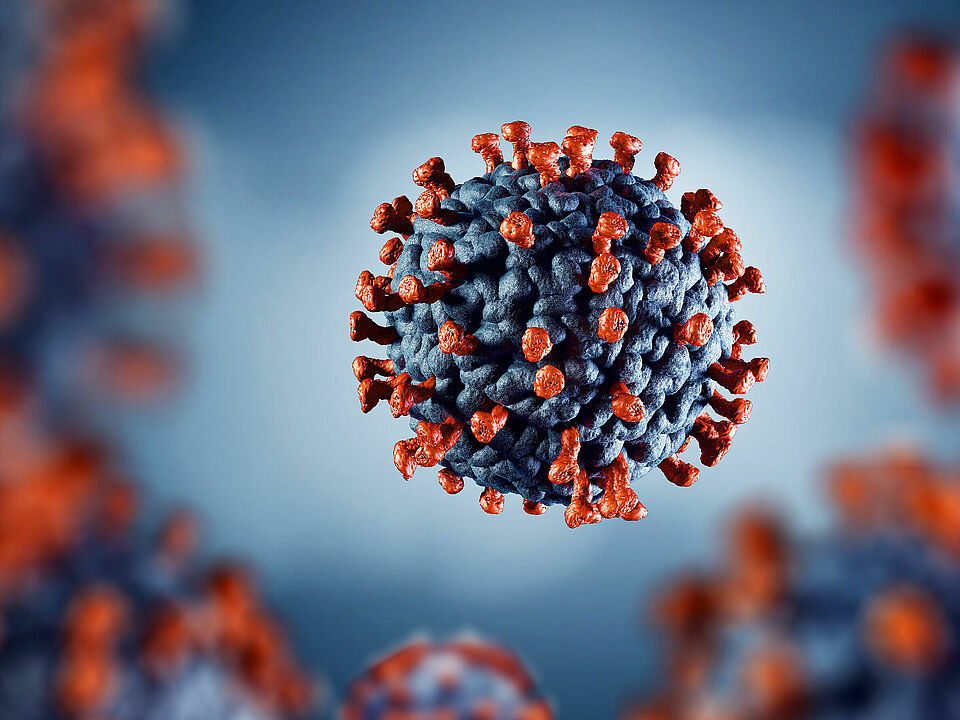Starting in early 2021, the German Federal Ministry of Health made the therapy option with monoclonal antibodies available to clinics in Germany, beginning with the mAb bamlanivimab. The antibody was to be used to treat SARS-CoV-2 in patients infected with the virus who still have mild to moderate symptoms and risk factors for a severe course of COVID-19.
Detailed scientific data were not available at this time for certain patient populations that are typically underrepresented in clinical trials, such as patients with marked immunodeficiency. It was not known whether and to what extent SARS-CoV-2 treatment with monoclonal antibodies could favor the occurrence of escape mutations, so-called immune escape virus variants, in this patient group.
Six patients who were expected to be at high risk for a severe course of COVID-19 based on their medical history - recent transplantation, hematologic disease, immunosuppression for autoimmune disease, or AIDS - were treated with bamlanivimab according to recommendations at that time. After treatment with the antibody the progression of SARS-CoV-2 viral load in the nasopharynx of several patients showed evidence of possible treatment failure of bamlanivimab therapy. So analysis of the complete genetic information (whole genome sequencing) of SARS-CoV-2 viral samples before, during, and after therapy was performed.
In five of these six patients (83.3%), the new occurrence of an E484K mutation was detected. The E484K mutation - known to cause immune escape - is also present in several of the "SARS-CoV-2 virus variants of concern (VOC)" such as beta, gamma, as well as other virus variants under observation (VOI).
"Since the E484K mutation can affect natural immunity, the efficacy of vaccinations, and many antibody-based therapies, these results could not only have important implications for individual treatment decisions, but also highlight risks for pandemic control measures," says Björn Jensen, M.D., first author of the study and division head of Special Infectious Diseases at the Department of Gastroenterology, Hepatology and Infectious Diseases at the University Hospital Düsseldorf. "In addition, when immunocompromised patients are treated in the outpatient setting, there would be a risk of transmission of these viruses with immune escape mutations to other individuals without targeted clinical and virological monitoring," warns Dr. Nadine Lübke from the Institute of Virology.
The weaker immune response in these immunocompromised patients leads to a prolonged phase of viral replication, which in combination with the narrowly focused selection pressure of a single monoclonal antibody could explain the rapid viral immune escape observed in these patients.
Based on these findings, the authors recommend, similar to experiences in other viral diseases, to preferentially use combinations of two or more monoclonal antibodies, thereby increasing the "genetic barrier" and at least reducing the risk of viral escape from antibody immunotherapy by mutation. Meanwhile, the combination of the mAb bamlanivimab/etesevimab on the one hand and the combined mAb casirivimab/imdevimab are available in Germany.
"Until further data are available, our results suggest that special caution should be exercised when using monoclonal antibodies in immunocompromised patients* infected with SARS-CoV-2," said Prof. Tom Lüdde, M.D., director of the Department of Gastroenterology, Hepatology and Infectious Diseases.
Publication:
Jensen B et al. Emergence of the E484K mutation in SARS-COV-2-infected immunocompromised patients treated with bamlanivimab in Germany. "The Lancet Regional Health - Europe," DOI: https://doi.org/10.1016/j.lanepe.2021.100164
Background:
Participating institutions at the University Hospital Düsseldorf are:
- Department of Gastroenterology, Hepatology and Infectiology.
- Institute for Virology
- Clinic for Anesthesiology
- Clinic for Hematology, Oncology and Clinical Immunology
- Institute for Medical Microbiology and Hospital Hygiene


